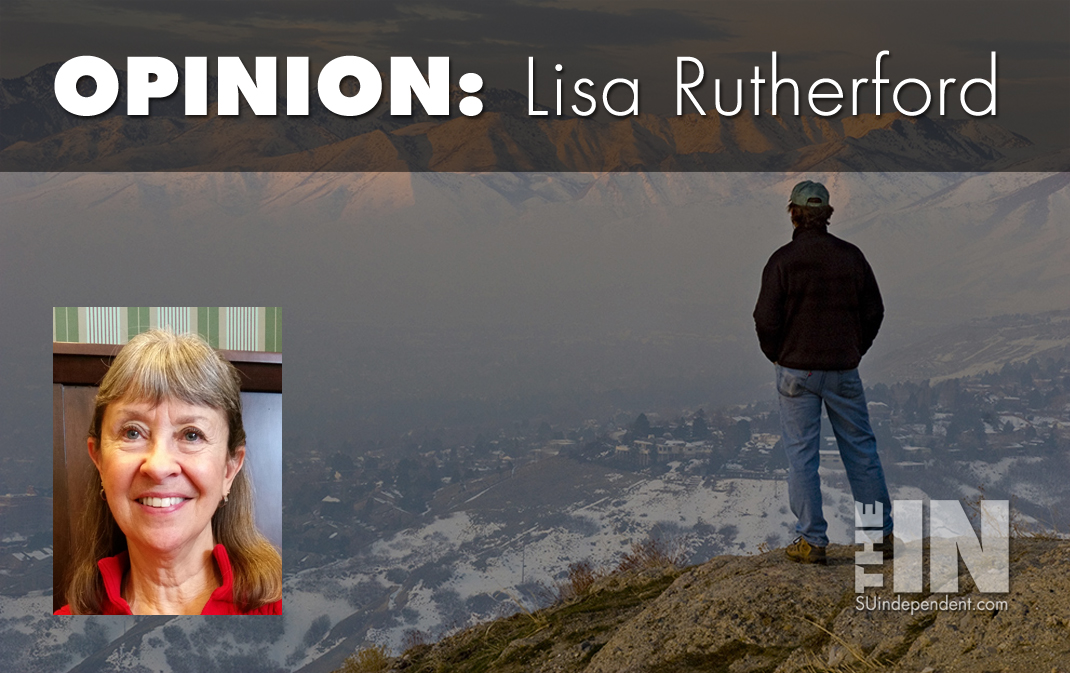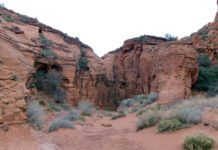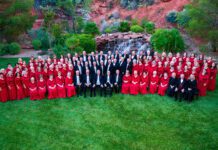
What Will Our Air Future Be?
– By Lisa Rutherford –
Anyone who’s witnessed what happens with growth knows that poor air quality can be a result. Just look at Utah’s Wasatch Front. It’s apparent that growth has had a dramatic and dismal effect on that area’s air quality. Some may argue that it’s better than in the past when coal was burned and thick soot was everywhere, but the problem now is more insidious. PM2.5, a main source of pollution from vehicle emissions and wood burning, is generally not visible to the naked eye. But when the Wasatch Front experiences its winter inversions, it is visible—very visible. When inversions are not present, people convince themselves there is no problem and go blithely along their merry way, exposing themselves and their loved ones to health problems.
So, perhaps you say, “Well, that’s the Salt Lake area. We don’t have to worry about that here in Washington County or elsewhere in Utah.” Perhaps not yet, but with this area projected to hit half a million residents by 2050 and add to that the thousands of visitors that we lure to our county yearly, it’s clear we have a problem brewing. The largest area in Washington County, St. George, sits in a bowl, similar to Salt Lake City. Visitors come to our area to visit Zion National Park, and as air quality worsens in St. George, that will impact the air quality in the park, too.
Many of our Washington County residents are older folks and youth who are most at risk for being harmed by poor air quality. Human Health and Economic Costs of Air Pollution in Utah: An Expert Assessment published in 2020 was the result of 23 local researchers and specialists who quantitatively estimated that “air pollution in Utah causes 2480 to 8000 premature deaths annually (90% confidence interval) and decreases the median life expectancy by 1.1 to 3.6 years. Economic costs of air pollution in Utah totaled $0.75 to $3.3 billion annually, up to 1.7% of the state’s gross domestic product.”
Recent research has shown that worldwide environmental pollution causes much worse damage to human health and the economy than previously thought—”5 times more deaths than caused by tuberculosis, AIDS, and malaria combined; 10 times more deaths than from transportation accidents; 30 times more deaths than global malnutrition; and 90 times more deaths than caused by all wars and terrorism.” Let that sink in a bit!
The referenced study provides many more grim details about pollution’s effects, but let’s get to what some are trying to do in Utah to rectify the situation and prevent environmental pollution from harming more of our family members, friends, and neighbors.
Clean The Darn Air (CTDA) is a ballot measure campaign to help improve Utah’s air quality. It is a grassroots citizens’ initiative to place a clean-air-and-climate measure on Utah’s 2024 ballot. All of Utah, including Southwest Utah, would benefit as we grow.
CTDA has a diverse group of individuals comprising their team. Heading the team are Dave Carrier, Organizational Outreach, and Yoram Bauman, Policy Analysis. Dave is a biology professor at the University of Utah and co-organized the 2016 faculty campaign to divest the university’s endowment from fossil fuels. He was a plaintiff in a successful lawsuit that rejected a massive expansion of Harper’s Quarry in Parleys Canyon. Yoram has a Ph.D. in economics. He founded and co-chaired the first-ever carbon tax ballot measure campaign in the United States, the I-732 campaign in Washington State, in 2016.
The team includes their Public Health Advocate, Jan Kennington, a retired Nurse Practitioner, and several campaign strategists. Casey Hansen has a dual-degree in Political Science and Economics from the University of Utah. London Kelley, another strategist, is studying Political Science and International Studies.
I serve as the team’s Southwest Utah Coordinator. I am extremely concerned about our future if we do nothing. I’ve witnessed the growth in our area over twenty-three years and see the handwriting on the wall.
The initiative’s basic proposal is to tax pollution instead of potatoes (i.e., eliminate the sales tax on grocery store food and replace it with a carbon tax) and use the money that’s left over to Clean the Darn Air! Besides eliminating the tax on grocery store food and taxing fossil fuels—the main problem—the measure includes these provisions:
- $100m a year for air quality programs, including $15m a year directed at clean air support of low-income communities.
- $50m a year for rural economies.
- Expand the state’s Earned Income Tax Credit match.
Folks, we know what this inflationary period has done to costs at the grocery store. Those of us who are economically secure have been able to manage our food purchases, but those at lower income levels have suffered greatly. And they are also the ones who generally suffer more from environmental pollution, given that they usually live in areas where pollution is greatest. We do not know how inflation will play out, but this initiative will help deal with those unfortunate costs and perhaps even allow lower-income people to eat healthier foods.
The initiative is fashioned to be fiscally balanced, so it doesn’t put additional costs on the state and taxpayers.
To qualify for inclusion on the 2024 ballot, CTDA needs to hit a statewide target (about 150,000 valid signatures) as well as targets of about 5,000 valid signatures in 26 of the 29 state senate districts. Three of these senate districts include southwest Utah. So, our signatures are important!
You can learn more about this important issue. A hearing on the initiative will be held on Sunday, February 12, 2023, at 12:30 pm and is open to the public. It will be held at The Room at the Square, 175 W 900 S #10 (across from the Red Lion and next to Croshaw’s Gourmet Pies), St. George, Utah.
The signature-gathering time period runs from mid-February through mid-November 2023. Go to https://www.cleanthedarnair.org/ to sign up for email updates and learn how to join the campaign. Let’s plan ahead and be part of our area’s air quality future!
Viewpoints and perspectives expressed throughout The Independent are those of the individual contributors. They do not necessarily reflect those held by the staff of The Independent or our advertising sponsors. Your comments, rebuttals, and contributions are welcome in accordance with our Terms of Service. Please be respectful and abide by our Community Rules. If you have privacy concerns you can view our Privacy Policy here. Thank you!
Click here to submit an article, guest opinion piece, or a Letter to the Editor





Thanks for the heads up, Lisa. I’ll do everything I can to spread the word about this and I will contact my elected representatives as well. Such tripe needs to be stopped before Utah is ruined completely by “regional” entities and activist groups who are neither elected nor accountable to the citizens for the changes they seek to ram through our legislature. It makes no damn sense at all to swap one tax for another (I read your links). But the consequences of ramming through this environmental activism being cloaked as environmental stewardship will surely damage Utah, its economy, and its citizens. Again, thanks for the heads up and all the helpful links.
Hey everybody. let’s get behind this so we can make Utah more like New Mexico!
If you want to eliminate the grocery tax quit buying processed foods. Another expansion of “low-income” support-really? Our middle class needs support and this “ain’t” it!
Eliminate a tax-what fantasy world do you live in? Coerce more taxes for more of the Green Revolution controlled by the likes of John Kerry? It’s different this time right? If the last 2 years have taught us nothing about this agenda we deserve to continue being “boiled like frogs”.
We can, and should, take action at the local level. Take heed of the last two years of our government’s centralized sponsored green agenda and learn a lesson for heaven”s sake. I’ll keep my gas stove thank you.
Count me as opposed.
MP